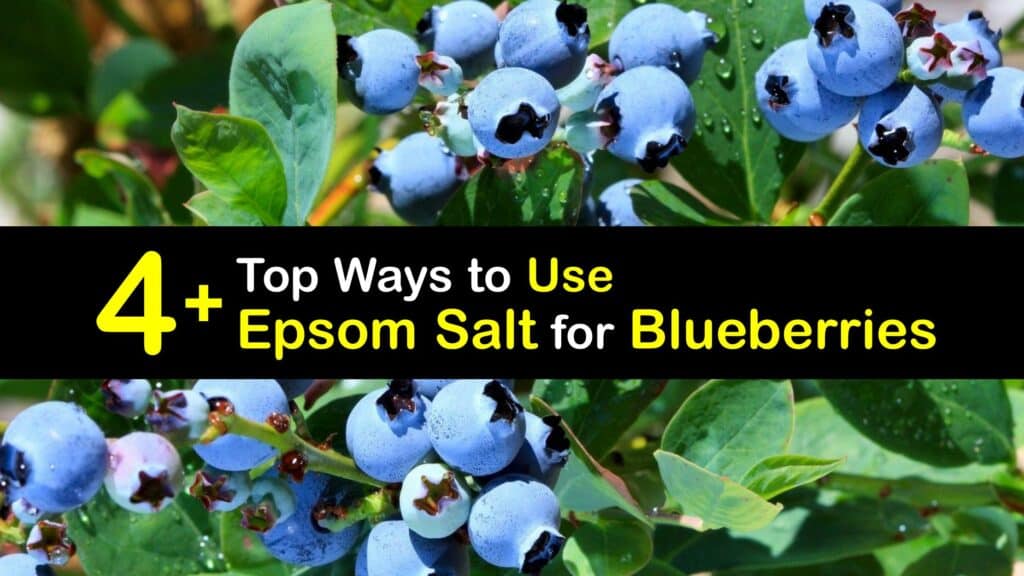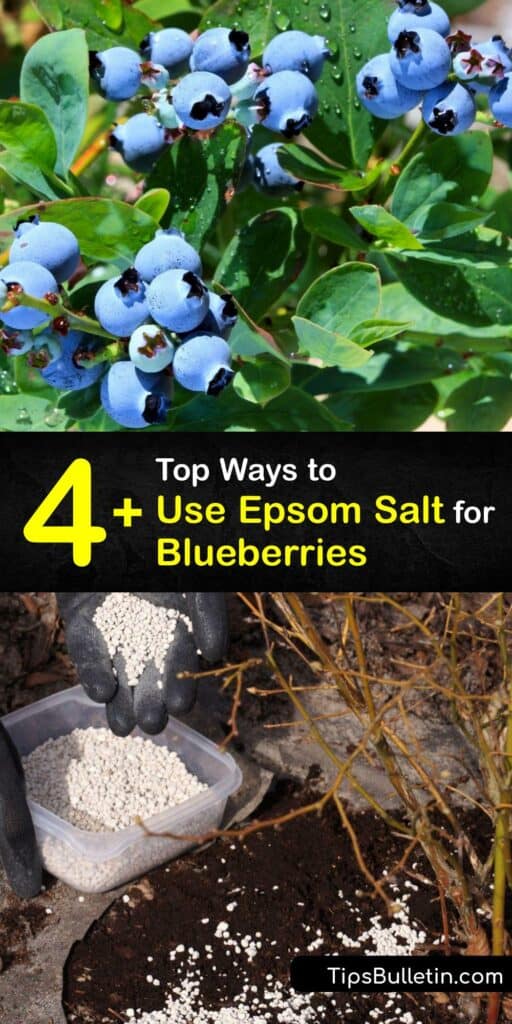Are you interested in why gardeners use Epsom salt for blueberries? Epsom salts usually live in the bathroom, not the shed, yet earn their place in the garden. Is Epsom salt good for blueberries? There are numerous benefits to using Epsom salt for blueberry bushes.
Blueberry bushes are acid loving plants. Many commercial fertilizers or amendments raise the soil pH too much to be safe for them, whereas Epsom salts are pH neutral. Though it might seem unlikely, these bathing salts help your blueberry bush be productive, keep it free of pests, and even fix a magnesium deficiency.
As we become aware of the effects of toxic chemicals and synthetic fertilizers, natural interventions such as Epsom salts and coffee grounds are becoming increasingly popular. If you keep an organic garden and need to eliminate slugs or want to ensure this year is your best blueberry harvest, Epsom salts can help.

Using Epsom Salt for Blueberry Bushes
Is Epsom salt good for blueberries? Epsom salt is a budget-friendly plant food for any blueberry gardener’s shed. Though we often consider it a soothing bath salt to relax stiff muscles, Epsom salt takes your blueberry harvest to the next level. Explore all the uses of Epsom salt for blueberries, from fertilizing to fixing magnesium deficiency and pest control.
Is Epsom Salt Good for Blueberries?
Is Epsom salt good for blueberry bushes? Though they’re best known as bath salt, Epsom salts are an excellent blueberry fertilizer as they’re made of magnesium sulfate. Like all plants, blueberries need nutrients like nitrogen, magnesium, and sulfur for leaf growth and fruit development.
The National Gardening Association confirms that using Epsom salts to fertilize potted plants help the plant be more productive, so growers produce more fruit in any given season.

One of the biggest difficulties growers face with blueberries is their reliance on acidic soil. Lots of common soil amendments and fertilizers make the earth more alkaline, which has disastrous effects on a blueberry bush.
Epsom salts have a neutral pH; they won’t make the soil less acidic. Their neutrality makes them a solid choice for acid-lovers like blueberry plants needing a boost of nutrients, a magnesium treatment, or some organic pest control.
Epsom Salt for Blueberries for Magnesium Deficiency
Magnesium is a critical nutrient for developing, growing, and fruiting blueberry plants. When the magnesium level in your native or container soil is too low, your blueberry bush’s health suffers. Epsom salts are ideal for treating magnesium deficient soil without altering pH since they contain tiny magnesium sulfate crystals.
Whether you noticed your lowbush or Rabbiteye blueberries developing red leaves (a classic marker of low magnesium) or had a soil test, don’t panic. Epsom salts are an affordable solution to boost magnesium levels quickly.
Spread about a quarter cup of unscented, undyed Epsom salts around the base of each blueberry bush and water deeply. Repeat the treatment in a week and retest your soil or observe for continued indicators of low magnesium levels.
How to Use Epsom Salt for Blueberries as Fertilizer
The benefits of combining Epsom salt and blueberries are numerous, whether you have lowbush or highbush blueberry plants. It’s inexpensive, simple, and organic to fertilize blueberry bushes with Epsom salts, making it ideal for growing many berries without a costly investment.
Save money and time by trading chemical fertilizer for a homemade acidic fertilizer for blueberry bushes. Sprinkle a thin layer of Epsom salts around the bases of your bushes before watering as usual, or blend the salt with water to produce liquid fertilizer.
Pour the water and Epsom salt into the sprayer and shake until combined. Spray on the fertilizer, covering the soil after planting in early spring and again as necessary to promote vitality and berry production.
Pest Control, Epsom Salt, and Blueberries
The magnesium sulfate in Epsom salt acts as a natural pesticide, protecting your budding blueberry plants from troublesome insects and illnesses like blossom end rot. Instead of spraying artificial insecticides on your growing blueberries, use a natural pest control method like Epsom salt.
If you detect bugs on your blueberry leaves or damage to the fruits, this essential bath salt offers a cost-effective and time-saving remedy.
Pour the Epsom salts and water into the sprayer, shake until blended, and distribute over your blueberry plants. Finish by adding a thin circle of Epsom salts around the bases of your blueberry bushes to deter slugs.
Monitor your plants for continued signs of pests and re-treat every few days to achieve pest control and once a month for maintenance.
Caring for Your Blueberry Plant Throughout the Growing Season
Garden or container grown blueberries require 6-8 hours of direct sunlight daily. Planting blueberry bushes in full sun and using acidic soil with soil pH levels ranging from 4.0 to 4.8 for the plants to absorb nutrients is best practice.
Purchase potting soil rich in organic matter with an appropriate blueberry soil pH to ensure your blueberry plants develop. Encourage soil acidity in native soil with amendments such as peat moss, vinegar, or ammonium sulfate.
Because its small root system dries rapidly, blueberries require a lot of water and sandy, well-draining soil. Water blueberry plants frequently enough to keep the soil moist but not waterlogged. A layer of compost with a topping of pine needles as mulch is also excellent for moisture retention.
Has this article given you a quick answer on the benefits of Epsom salt for blueberry bushes? Whether you’re planting blueberries for the first time in early spring or are an experienced fruit producer, Epsom salts are a valuable gardening tool.
Epsom salts are affordable and readily available with personal care or bathing products at any pharmacy. Treat magnesium deficits, fertilize, or get rid of pests without using synthetic and expensive store-bought products with Epsom salts.

If you loved this educational article on Epsom salt for blueberries, please share it with your friends and family who ask, “Is Epsom salt good for blueberries?” on Pinterest and Facebook.